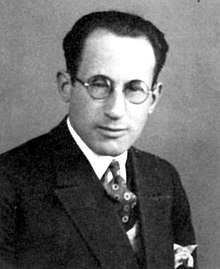Lothar Hermann
Lothar Hermann (November 11, 1901 – July 6, 1974) [1] was a German Jew and concentration camp survivor who contributed to the identification and arrest of Adolf Eichmann, one of the major organizers of the Holocaust.

Early life and exile
Hermann was born in 1901 as the third son of the cattle trader Max Hermann and his wife Sophie in the small town of Quirnbach in the Westerwald. Some of his eleven siblings died early. After school he completed a commercial apprenticeship in Wittlich at the Jewish textile house Stulz and then worked in a collection office.
From his apprenticeship onwards he was possibly a member of the KPD (German Communist Party). Although not a Zionist, he and his brother Ludwig are said to have regularly smuggled foreign currency from Germany to France to support Jews in Palestine. He attracted the attention of the police on several occasions. In 1935 he was caught red-handed with 90 Reichsmarks in a foreign currency smuggling operation to France, arrested by the Gestapo and imprisoned in the Dachau concentration camp on suspicion of espionage. There he was severely maltreated and lost the sight of one eye as a result of beatings.
After his release from the concentration camp, Hermann left Germany for the Netherlands in August 1936. There he met his later non-Jewish wife Marta Waldmann. In December 1938 he emigrated with his wife via Rotterdam to Montevideo (Uruguay) and then moved on to Argentina. In 1942 his daughter Silvia was born, but she was not brought up in the Jewish faith. During the Nazi era, his entire family was murdered, with the exception of his brother Hugo and three other relatives.
Exposure of Adolf Eichmann
After the end of the Second World War, Hermann lived as a stateless Jew in Olivos in the metropolitan area of Buenos Aires. As a pension advisor he helped German-Jewish immigrants in asserting their claims for reparations. During the Nazi dictatorship, Argentina had become the third most important country of exile for European Jews. During Juan Perón's presidency, however, a growing number of fugitive perpetrators of the Nazi regime arrived in Argentina, who had nothing to fear under Perón until his overthrow in 1955. In the years that followed, Argentina showed little interest in prosecuting and extraditing the Nazi German criminals.
In 1954, Hermann's daughter Silvia, then 12 years old, happened to meet Eichmann's eldest son Klaus, who was 17 years old at the time, in the York district cinema. Lothar Hermann, who in the meantime had cataracts in his other eye and was almost blind, suspected after research that this Klaus was the son of Adolf Eichmann. As late as 1954, Hermann passed on his suspicions first to the Jewish community in Buenos Aires and then to the DAIA (Delegacion de Asociaciones Israelitas Argentinas), the Jewish political umbrella organization in Argentina, but they did not react. Hermann then passed on his information to Fritz Bauer and also to Tuviah Friedman, who was trying to investigate Nazi criminals from Israel, but was massively hindered by the Israeli authorities in further contact with Hermann. Fritz Bauer, who at the time was working in Hesse as General Prosecutor, in turn passed this information on to the Israeli foreign secret service Mossad by secret means. With the help of his daughter Silvia, Lothar Hermann was finally able to prove that Klaus' father Riccardo Klement had a false name and was in fact Adolf Eichmann. After initial doubts, Mossad agents shadowed Adolf Eichmann and finally abducted him to Israel in 1960, where he was put on trial in 1961 and executed after his conviction in 1962.
Hermann himself, when he wanted to publicly explain the complete background of Eichmann's arrest and the hindering measures taken by the Argentine government, was taken into custody by the Argentine police in 1961 (under the pretext that the Mossad had found the concentration camp doctor Josef Mengele, who was suspected to have been in Argentina) and tortured in prison. Only a comparison of the fingerprints exonerated him 14 days after his arrest, and Hermann was released. Later he would never speak about these events again; only through his grandniece Liliana Hermann did they become public.
References
- "Database Hermann Lothar". rpb.lbz-rlp.de. 2020-05-20. Archived from the original on 2020-05-20. Retrieved 2020-05-20.